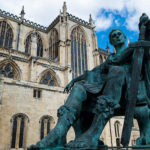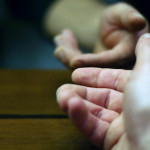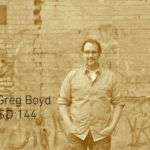We run our website the way we wished the whole internet worked: we provide high quality original content with no ads. We are funded solely by your direct support. Please consider supporting this project.

Do Not Fear
We interrupt this election season to bring you the following reminder:
[F]ear is a diabolic force. Its ultimate creator is Satan, and he uses it to keep us in bondage (Heb. 2:15). Throughout history, leaders have used fear to rally the masses around their causes, sometimes getting them to do things they otherwise would never dream of. Most of the worst atrocities committed in history–by so called Christians and others–were motivated by fear. People felt threatened, demonized the ones who threatened them, and thus felt justified in doing whatever they thought necessary to protect themselves. It is impossible to live in love and live in fear at the same time, which is why Scripture says that love casts out fear (1 John 4:18).
Now, as kingdom people we are called to live in love, which means we are called and empowered to live free of fear. Because our source of worth, significance, and security is found exclusively in God’s love and God’s reign, not our own immediate well-being, and because we believe in the resurrection, we are empowered to love even those who threaten our well-being–for this does not threaten our essential worth, significance, and security. We are, therefore, not to fear them (see 1 Peter 3:14-18). If we do fear them, it is only because some element of our essential worth, significance, and security is rooted in what they threaten. In other words, fear is an indication that we are living in idolatry, not love.
All this is to say that kingdom people whose lives are exclusively rooted in Jesus Christ will not succumb to motivation by fear. Our motivation for all we do is to be love, not fear (1 For. 16:14; 2 For. 5:14).
–The Myth of a Christian Nation, pp. 179-180
Photo credit: Greg Rakozy via Unsplash
Category: General
Tags: Fear, Love, Politics, Religious Idolatry
Related Reading

Revolting Against Classism
All fallen societies and religions have a tendency to rank people according to class. All have ways of separating the insiders from the outsiders, the holy from the unholy and the more important people from the less important people. Jesus revolted against classism by the way he lived, a way defined by the Kingdom. Now,…

Zombies
What would Halloween be without a post about zombies? Image by rachel a. k. Sourced via Flickr.

A Brief History of Political Power and the Church
The history of the church has been largely one of believers refusing to trust the way of the crucified Jesus and instead giving in to the very temptation he resisted. It’s the history of an institution that has frequently traded its holy and distinct mission for what it thought was a good mission. It is…

Cross-like Love and Non-Violence
Cosmo Spacely via Compfight Though it seems to have been forgotten by many today, the cross wasn’t simply something God did for us. According to the NT, it was also an example God calls us to follow. Hence, after John defined love by pointing us to Jesus’ death on the cross on our behalf, he…

Love and Free Will
God could have easily created a world in which nothing evil could ever happen. But this world would not have been capable of love. God could have preprogrammed agents to say loving things and to act in loving ways. He could even have preprogrammed these automatons to believe they were choosing to love. But these…

Christianity and American Politics
Greg was recently featured in Missio Alliance’s Seminary Dropout podcast to share his thoughts about the role of Christians in American politics. Today we’re sharing part 1 of that conversation. What is the role of the Christian in American politics? Should Christians vote? In this election filled with scandal and unprecedented vitriol, how can we display…
